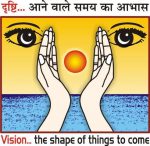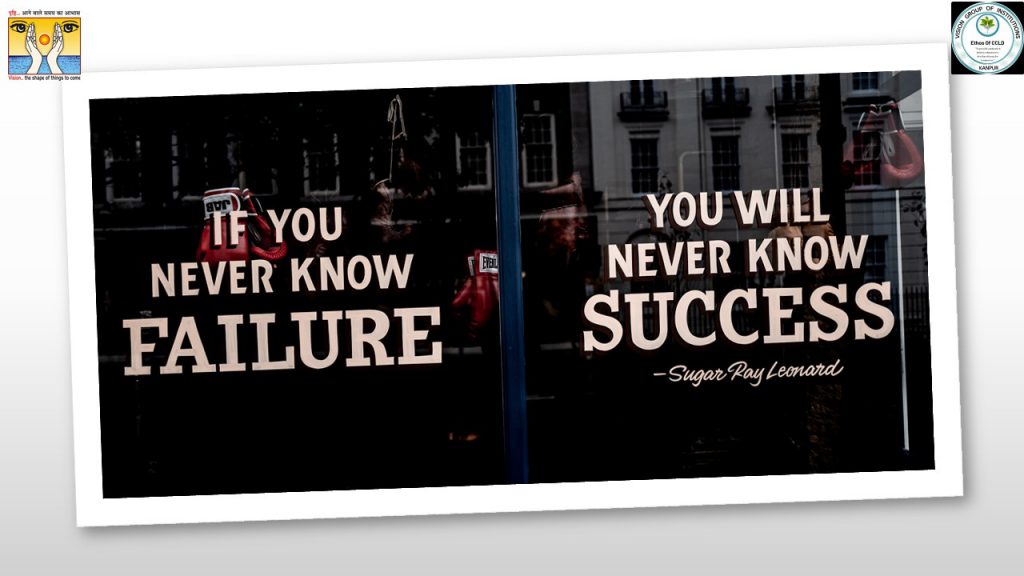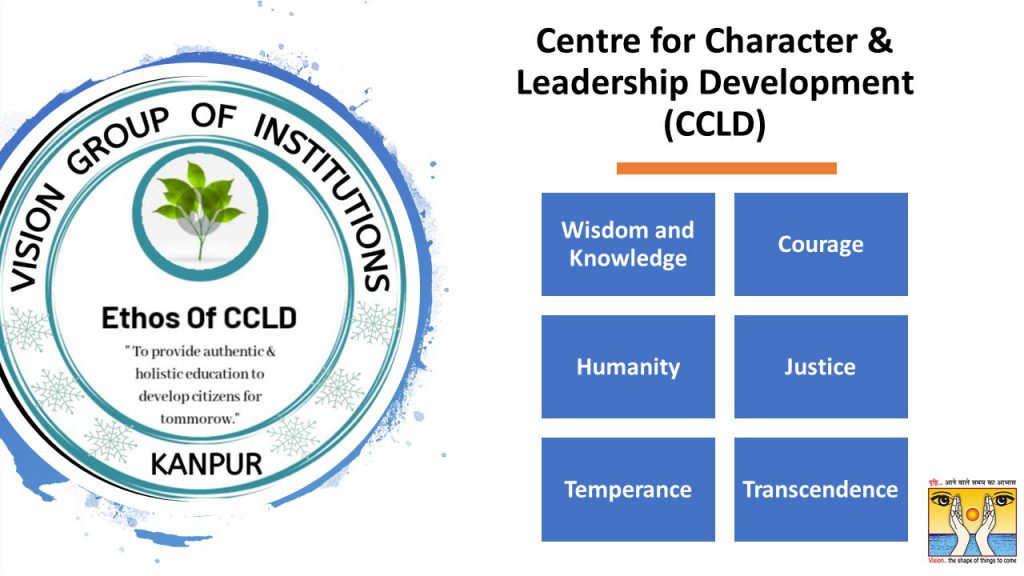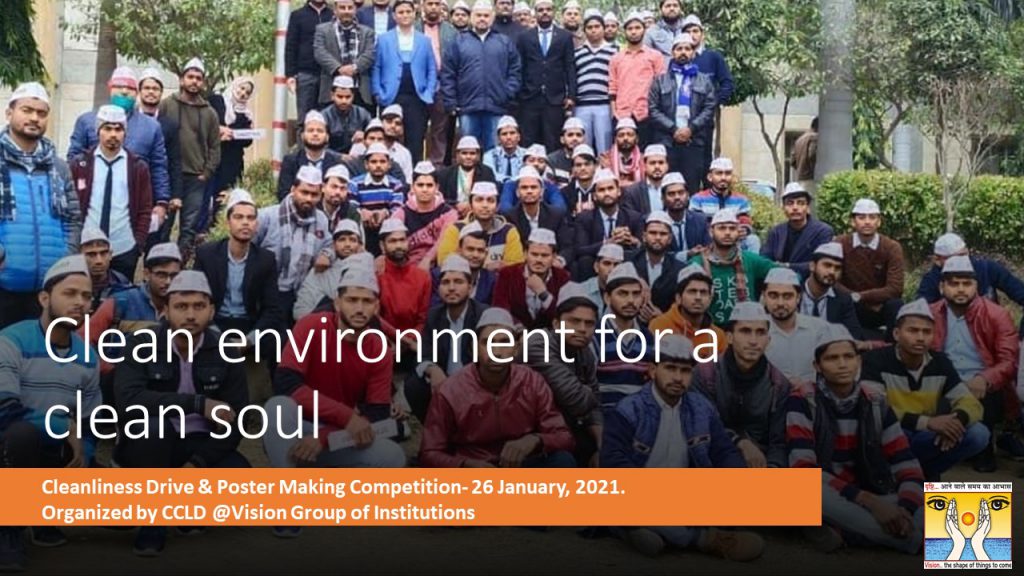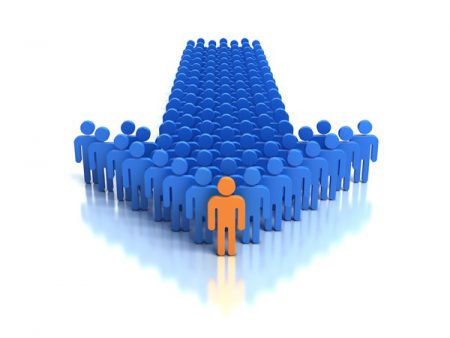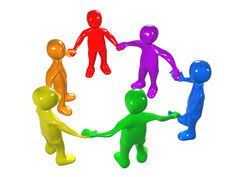Our Vision & Mission
The Center for Character and Leadership Development is Vision Group of Institutions most visible focal point for understanding, enhancing and integrating College Students and staff efforts to achieve the essential mission of developing citizens of character.
We earnestly wish to ingrain human values of cooperation, compassion, empathy, fairness and concern in all our students. We focus on developing resilience, grit, persistence, self-control, curiosity, conscientiousness, critical thinking and self-confidence as constituent characteristics of our students; which would ultimately aid them in leading a more fulfilling and satisfied life.
Ethos of CCLD
CCLD is formed with a specific long term aim – to develop a better citizens of tomorrow. We have an ethos of CCLD with Community development statement, our Mission statement, our Vision, and our team.
Our Team
- Kamlendra Yadav, Asst. Dean & HOD, Head of CCLD
- Ayushi Nigam, Asst. Professor CS
- Abhishek Srivastava, Asst. Professor EN
- Ashutosh Singh, , Asst. Professor ME
- Sonali Srivastava, Asst. Professor Management
- Kirti Tiwari, Asst. Professor Management
Student Office Bearers
- Shreya Tripathi CS 4th year
- Ali Ahmad CS 4th year
- Kshitiz Dwivedi CS 4th year
- Tripti Tiwari CS 4th year
- Akash Dwivedi AG 4th year
- Pritika Batra AG 4th year
- Priyanshu Sharma AG 4th year
- Prajwal Mishra BCA III
- Shreya BBA II
- Mitali Awasthi BBA II
- Akash BBA II
- Sapna Singh BBA II
- Fiza Alam BBA II
- Mansi Tiwari BBA II
Various Initiatives taken by CCLD Cell of Vision Group of Institutions
Celebrate your mistakes
Many students shy away from challenging assignments/projects and get discouraged quickly when they make mistakes….
Ethos of CCLD
It is our primary mission to provide Authentic & Holistic Education to develop citizens for…
Equity & Inclusivity: Quest to empower Women of 21st Century
Mother, Wife, Grandmother, Daughter, Sister, Aunt, Lover, Friend, College, Senior, Junior, Classmate…Vision Group Salutes to…
Clean environment for a clean soul
On the occasion of 72nd Republic day, CCLD organized an awareness and cleanliness drive on…
The Classification of Character Strengths and Virtues
Character is the aggregate of who we are; it’s “what’s inside every one of us.”. It is a broad and complex family of thoughts, feelings, and behaviors that are recognized and encouraged across cultures for the values they cultivate in people and society. Dr. Chris Peterson led a 40-person team, over a three-year period, to better understand character and its manifestations. Alongside Dr. Martin Seligman, Dr. Peterson then wrote an 800-page book on the research called Character Strengths and Virtues.
The 6 classes of Character Virtues
There are 6 classes of virtues that are made up of 24 character strengths (Character Strengths and Virtues, Martin Seligman, Christopher Peterson)
- Wisdom and Knowledge
- Courage
- Humanity
- Justice
- Temperance
- Transcendence

The 24 Character Strengths
The 24 character strengths that are evident in the most widely influential traditions of thought in human history. Robust evidence of all 24 strengths existing throughout time and in all cultures of the world. All 24 character strengths exist in every individual.
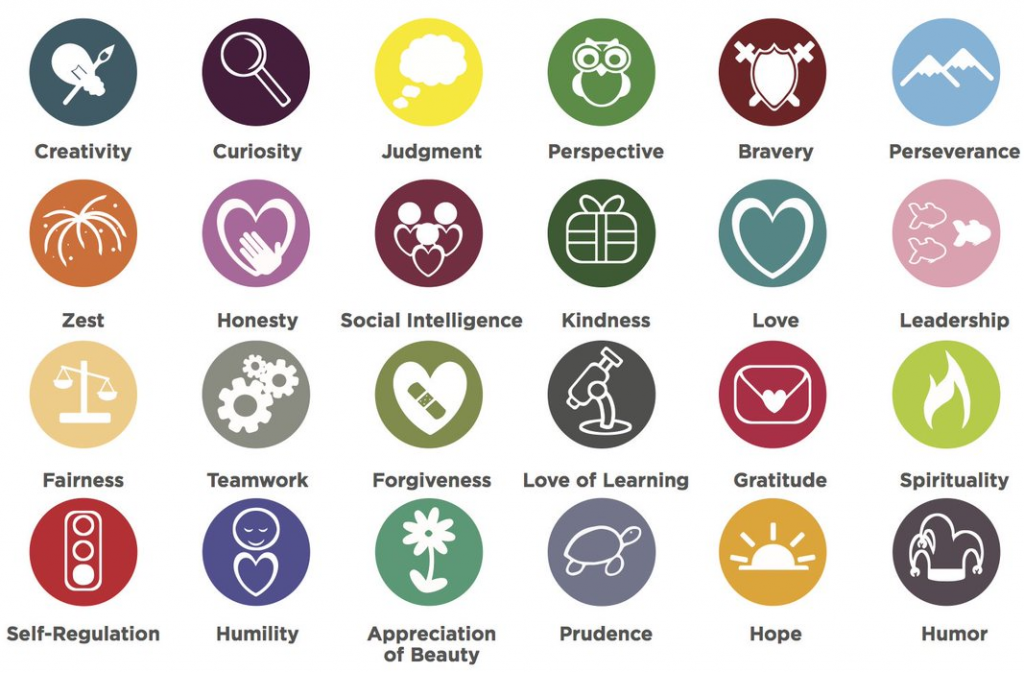
Ranging from bravery and forgiveness to integrity and gratitude, these character strengths are the foundation of The Positivity Project’s model.
Making students aware that every one of them has all 24 character strengths, provides the foundation for genuine self-confidence grounded in self-awareness. At the same time, it helps students better understand why everyone is different and how to appreciate those differences. Unlike our height, weight, or skin color, character is something that can’t be seen with the naked eye. Therefore, understanding and valuing it — especially in other people — requires a framework of consistent reflection and discussion.
Character strengths aren’t about ignoring the negative. Instead, they help us overcome life’s inevitable adversities. For example, you can’t be brave without first feeling fear; you can’t show perseverance without first wanting to quit; you can’t show self-control without first being tempted to do something you know you shouldn’t.
Important Traits for Character & Leadership Development
At CCLD of Vision Group of Institutions we have selected 7 Character Traits from the 24 above which we will strive to reinforce in all of our students.
Diversity Equity & Inclusion- the toolkit for organizational culture
A 10 minutes read.By Vishal P Pandey ‘DEI’- the building blocks of an organization The…
Leadership
Leadership is both a research area and a practical skill encompassing the ability of an…
Social Intelligence
Social intelligence is the capacity to know oneself and to know others. Social Intelligence develops…
Understanding CCLD
Educationists have since long harbored on methods to improve the Cognitive Abilities of the students. Scientist such as Hart and Risley, and numerous educationists round the world have been advocating methods to improve the students purely on basis of enhancing their cognitive abilities. There is something undeniably compelling about the cognitive hypothesis- such a clear case of inputs here leading to outputs there. Fewer books in the home means less reading ability; fewer words spoken by parents means a smaller vocabulary for their kids; more math worksheets at Junior school means better math scores. Parents have always stayed convinced that more homework and hard rule of disciplining their ward is a definite way to success. This becomes even more pronounced in Higher educations and especially when we are talking of specialized courses like Engineering & Medical Sciecnes.
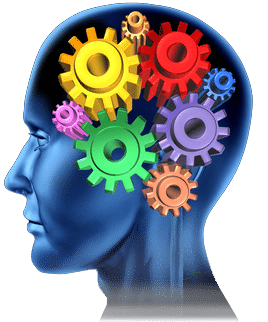
Cognitive Abilities
Cognitive skills involve conscious intellectual effort, such as thinking, reasoning, and remembering. Cognitive abilities are brain-based skills we need to carry out any task from the simplest to the most complex. They deal with the mechanisms of how we learn, remember, problem-solve, and pay attention. Children develop cognitive skills rapidly in the first few years of life and build on them progressively throughout their school and college.
Perhaps the time has come to ask ourselves whether all this is really true? We need to dwell deep into questions like Who succeeds and who fails? Why do some students thrive while others lose their way? And what can any of us do to steer an individual child —or a whole generation of students towards succeeding in life.
Need to look beyond Cognitive Abilities
In the past decade, and especially in the past few years, a disparate congregation of economists, educators, psychologists, and neuroscientists have begun to produce evidence that calls into question many of the assumptions behind the cognitive hypothesis. What matters most in a child’s development, they say, is not how much information we can stuff into her brain in the first few years. What matters, instead, is whether we can help her develop a very different set of qualities, a list that includes persistence, self-control, curiosity, conscientiousness, grit, and self-confidence. Economists refer to these as noncognitive skills, psychologists call them personality traits, and the rest of us sometimes think of them as character.
For certain skills, the stark calculus behind the cognitive hypothesis —that what matters in developing a skill is starting earlier and practicing more —is entirely valid. If you want to perfect your air rifle shot, shooting fifty shots every afternoon is indeed going to be more helpful than shooting ten shots a week. If you’re in fourth class, reading forty good story books over the summer is going to improve your reading ability more than reading four books. Some skills are really are mechanical.
However when it comes to developing the more subtle elements of the human personality, things aren’t so simple. We can’t get better at overcoming disappointment just by working harder at it for more hours. Students don’t lag in curiosity simply because they didn’t start doing Vedic Maths Classes or Dance Classes at an early enough age. However the interesting fact is that the pathways through which we acquire and lose these skills are certainly not random —psychologists and neuroscientists have learned a lot in the past few decades about where these skills come from and how they are developed —but they are complex, unfamiliar, and often quite mysterious.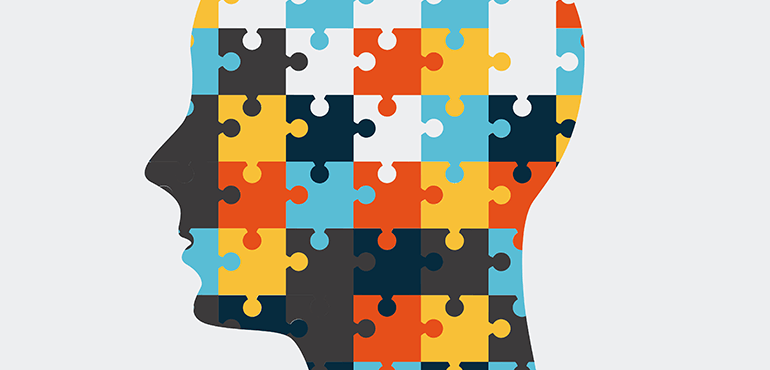
Non Cognitive Skills
Noncognitive or “soft skills” are related to motivation, integrity, and interpersonal interaction. Noncognitive skills are associated with an individual’s personality, temperament, and attitudes. They include emotional maturity, empathy, interpersonal skills and verbal and non-verbal communication. Noncognitive skills influence the overall behavior of a person.
According to James J. Heckman and Alan B. Krueger, who are renowned scientists in the field of Noncognitive studies, sometimes, the most persistent, self-disciplined, adaptable and reliable students and professionals outperform those with higher cognitive abilities. This is acquiring more weight with the advent of technology and coming of Machine Learning & Artificial Intelligence
Vision Institute of Technology has held number of workshops & sessions to address this issue. This is a process, which is growing clearer and gathering momentum in classrooms and clinics and labs and lecture halls across the country and around the world. According to this new way of thinking, the conventional wisdom about student development over the past few decades has been misguided. We have been focusing on the wrong skills and abilities in our children, and we have been using the wrong strategies to help nurture and teach those skills.
We have tried to compile various such methods, strategies & research papers on our website for assisting the faculties & parents. Please go through these to expand your horizon while searching answers to the above questions.
